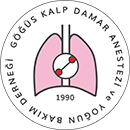

Catheter-associated Bacteremias in Neonates and Infants Following Congenital Cardiac Surgery: A Single-center Experience
Onur Özalp1, Halise Zeynep Genç2, Selin Saglam3, Eymen Recep4, Erkut Özturk2, Ali Can Hatemi41Department of Infectious Diseases and Clinical Microbiology, University of Health Sciences, Başakşehir Çam and Sakura Hospital, İstanbul, Türkiye2Department of Pediatric Cardiology, University of Health Sciences, Başakşehir Çam and Sakura Hospital, İstanbul, Türkiye
3Department of Anesthesiology and Resuscitation, University of Health Sciences, Başakşehir Çam and Sakura Hospital, İstanbul, Türkiye
4Department of Pediatric Cardiac Surgery, University of Health Sciences, Başakşehir Çam and Sakura Hospital, İstanbul, Türkiye
Objectives: Congenital heart diseases (CHD) are among the most common reasons for intensive care unit (ICU) admission in neonates and infants. Catheter-associated bacteremias (CAB) can lead to increased morbidity and mortality in these patients. This study aimed to investigate the incidence of CAB and the risk factors influencing its development in neonates and infants undergoing congenital heart surgery.
Methods: This retrospective study included patients younger than 12 months who underwent congenital heart surgery and were monitored in a pediatric cardiac intensive care unit between January 1, 2022, and January 1, 2025. The type, location, duration of catheterization, and associated complications were recorded. Demographic data, clinical characteristics, and outcomes were summarized on a per-patient basis. Each case was matched with two control patients based on age and date of surgery. The results were analyzed statistically.
Results: During the study period, congenital heart surgery was performed in 1,200 patients under the age of 12 months. Catheter-associated bacteremia was detected in 32 cases (2.6%). Among the isolated bacterial agents, 84% were gram-negative organisms and 16% were gram-positive organisms. Independent risk factors associated with CAB were: RACHS-1 ≥ 4 (OR 1.2, 95% CI 1–1.5), central venous catheter (CVC) duration > 10 days (OR 1.9, 95% CI 1.2–5), ECMO support (OR 0.8, 95% CI 0.6–2), and delayed sternal closure ≥ 2 days (OR 0.6, 95% CI 0.4–2). The mortality rate due to catheter-associated bacteremia was 18.7%, which was 5.8 times higher compared to the control group.
Conclusion: Catheter-associated bacteremias are a significant cause of morbidity and mortality in neonates and infants undergoing congenital heart surgery, and the majority are caused by gram-negative microorganisms.
Keywords: Catheter-associated bloodstream infection, congenital heart surgery, pediatric cardiac intensive care unit
Manuscript Language: English
(186 downloaded)

















